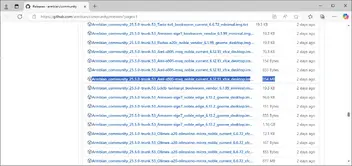You can find a couple of AMLMX test images here: https://chewitt.libreelec.tv/testing/
Code is here: https://github.com/chewitt/LibreELEC.tv/commits/amlogic-mx
Things are super-experimental and you will note from the date/time stamps on those files that I haven't worked up the enthusiasm to rebase anything onto LE12. And since I just started a new job, and accidentally ended up helping to manage the Tvheadend project too, and have a major Triathlon to train for later in the year .. I'm rather time poor these days so I wouldn't hold breath.
AMLMX really needs someone with some of those boxes to take the lead..
The biggest impediment taking on a role of sustaining Amlogic S8xx (AMLMX) releases is being tooled-up with an up-to-date and robust build environment including computing gear and devices to tinker about with for testing, diagnosis, debugging, and generating packages. Getting LibreELEC built and working from a cross-development environment, could take day(s) when generating everything from source. Using alternative approaches, it still took hour(s) by specifically upgrading old target build releases instead. Settled on a more manageable approach to achieve the same results now within minutes. There are several target ARMHF platforms with already generated Armbian releases, which is the quickest to get going.
With the supplied patch archive, integrating Martin's modifications for AMLMX GitHub - xdarklight/linux at meson-mx-integration-6.9-20240323 , it can be used with recent kernels and several LTS ones in order to build LibreELEC and bring Armbian up to scratch by including the latest built DTB corrections for most target platforms. A more recent patch for Linux 6.13 exists for AMLMX https://github.com/xdarklight/lin…n-6.13-20250112, however, unidentified kernel panics have been observed on startup and shutdowns. In addition, with the recent Linux 6.16 changes for AMLMX, drivers for the microSD do not seem to work. Currently with the Linux 6.18 release, there are kernel DRM panics and a memory leak, however, the display driver still initializes. The problem remains to be investigated. Suspect that changes to kernel DRM are suspect. Corrections to the DRM memory leak have been applied to kernel 6.18 & 6.19. The remaining legacy kernels still work correctly.
Even if installing an Armbian minimalistic releases, including XORG and KODI, a similar operating media box environment as LibreELEC is functional. Sure, not a one-stop-shop with a "Just Enough OS" for KODI solution, but still easier to work on. The Armbian development environment can be easily brought up by merging/overlaying the boot and configuration files from the SLAzurin Release Armbian 21.11.0 Linux 5.14-rc2 for AML s8xx Docker enabled · SLAzurin/build-armbian-custom · GitHub build over any recent right at the trunk OneCloud Releases · armbian/os · GitHub, an Amlogic S805 version of Armbian (MESON), or from the archives 'https://dl.armbian.com/onecloud/archive', including a GUI environment, should your box have sufficient memory resources.
After downloading and creating the media images on an SD card, copying the existing boot files from each card into a separate folder for reference, then copying the highlighted missing Amlogic boot files and configuration template to the already created OneCloud SD card boot partition.
Edit the uBoot environment text file "uEnv.txt" settings for your target platform DTB, change the root partition from "ROOTFS" to "armbi_root", since this LABEL has changed from way before. The SD card can now be used to bring up Armbian. Thereafter, the Linux and LibreELEC sources can be retrieved, rebuilt, changed, tested on your target box.
While this should come up on most if not all AMLMX boxes, not all features work since the generated OneCloud Showing results for 'onecloud'. - Armbian Community Forums releases are based on unpatched mainline Linux drivers and older DTS configurations. For the time being, rebuilding and replacing the Linux kernel and initial ramdisk image with the supplied patch file using Martin's fixes gets the job done until the mainline is brought up to speed and this last step will no longer be necessary. With the patched Linux kernel, it can be used as a starting point in integrating Christian's GitHub - chewitt/LibreELEC.tv at amlogic-mx branch for AMLMX.


